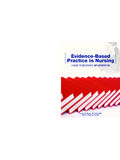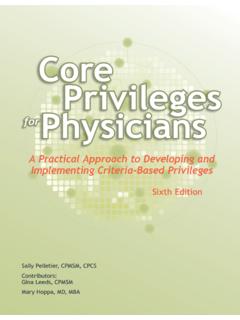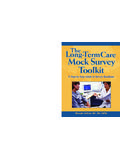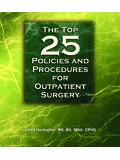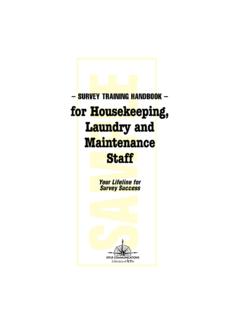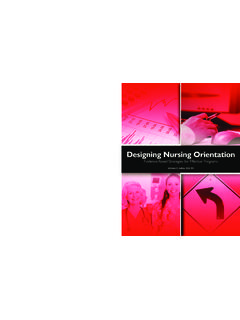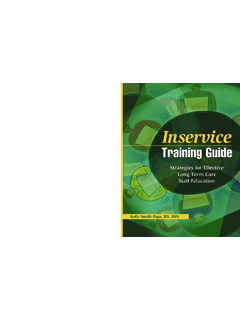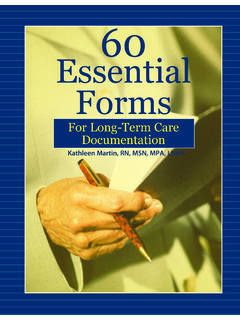Transcription of New Questions, Games, and Other Strategies to Prepare Your ...
1 New Questions, Games, and Other Strategies to Prepare Your Staff for SurveyKathryn A. Chamberlain, CPHQR eady, Set, JCAHO! Third EditionAbout the Author .. vi Introduction .. 1 Who this book is for .. 3 How to use this book .. 4 How the book is organized .. 4 About the CD-ROM .. 5 Section I: Planning and Organizing .. 7 Getting started .. 9 Barriers to consider .. 9 Creating your continuous survey preparation training plan .. 11 How to make your ongoing training activities successful .. 13 More Strategies for success .. 14 Section II: Questions by Focus Area and Staff Level .. 27 Top 10 Questions Every Staff Member Should Know .. 33 Questions by Focus Area .. 35 Patient rights .. 36 Provision of care .. 51 Medication management .. 78 Infection control .. 91 Patient safety/Performance improvement.
2 97 Leadership ..130 Safety/Environment of care ..145 Human resources .. 163 Management of information .. 174 ContentsReady, Set, JCAHO! Third EditionContentsQuestions by Staff Level .. 187 Governing body ..189 Executives .. 191 Clinical managers and supervisors .. 195 Nonclinical managers .. 202 Clinical staff ..206 Nonclinical staff .. 212 Medical staff leaders ..214 Medical staff ..219 Section III: Practicing Patient and System Tracers..225 Introduction .. 227 Patient tracers .. 227 System tracers .. 228 Patient tracer activities .. 229 System tracer activities .. 234 Tracer questions .. 239 Section IV: Games, Events, and Tools for Staff Training .. 253 Games .. 257 JCAHO Apprenticeship .. 259 Patient Safety Poker .. 262 JCAHO Jeopardee ..265 Additional Jeopardee Questions.
3 273 JCAHO Trivia .. 279 JCAHO Feud ..286 JCAHO Knowledge Bowl ..290 JCAHO Bee .. 292 Who Wants to Be a JCAHO Expert? .. 294 Events .. 299 JCAHO Hospital of Horrors ..301 JCAHO Carnival .. 303 Patient Safety Day .. 310 Organizationwide Contest ..313 Scavenger Hunt ..315 Ready, Set, JCAHO! Third EditionContentsUnannounced Visits/Surprise Surveys .. 319 Practice Conferences/Interviews .. 320 Training Session Ideas .. 323 Case Study: JCAHO Survivor .. 327 Tools .. 335 Flashcards .. 337 Newsletters .. 339ID Badges/Information Tags .. 343 Paycheck Reminders .. 344 Poster Ideas/Restroom Reminders .. 345 Stickers .. 350 Question and Answers on Your Intranet .. 351E-mail Ideas .. 352 Checklists .. 354 Quizzes .. 365 JCAHO Prep Booklet .. 369 JCAHO Cheat Sheet.
4 370 Other Tools .. 371 Ready, Set, JCAHO! Third EditionGetting startedIf you have been responsible for your organization s standards compliance for any length of time, you already know that preparing employees, leaders, physicians, volunteers, students, and board members for a JCAHO survey can be difficult. Everyone is busy and has Other interests and demands on their time that distract from the message you are trying to communicate. In addition, each group may respond differently to the information/tools you use. Therefore, it s critical that you know your audience and use that knowledge to select the approach that best meets their needs. Don t burden them with information that is not pertinent to their role in the organization; focus on topics that are meaningful to them.
5 Barriers to considerSome common trouble spots you will have to overcome as you develop an annual training plan include:I don t have time for this!Physicians, executives, board members, and department managers are busy, and they have difficulty attending additional meetings or paying attention to informa-tion they may consider to be extraneous. To get their attention, request to be invited to their regular meetings, and then educate them with tailored, bulleted handouts they may use throughout the and OrganizingSECTIONI10 Ready, Set, JCAHO! Third EditionSection iCommunicating to the massesIn most hospitals, some groups such as the nursing and medical staffs are large. Take steps to ensure that communication is consistent across an entire group. You may need to use existing department or service meetings or hold shift meet-ings.
6 You also may need to develop multiple ways to deliver the same message, depending on how you think a group learns give me the facts!No one wants to be deluged with information that they perceive to be needless, especially if they don t understand it or feel that they never will use it. Therefore, tailor all information to each audience. If you are not sure what information is appropriate for a particular staff group or department, work with managers and Other leaders to find out. Infection control for environmental staff, for example, is different from infection control in the surgical don t do that here!The culture of an organization may dictate what types of activities you select. For example, one organization s potty training campaign ( , JCAHO tips posted in staff bathrooms; see Section IV) may be totally unacceptable in your organization.
7 If you have doubts about the appropriateness of a training method, consult your human resources or staff development s going to pay for this?No healthcare organization has unlimited resources. Whether the constraints are money, time, or prioritization, maintaining survey readiness and standards compli-ance must be accomplished using only available resources. Therefore, plan ahead to develop a reasonable budget. Involve key stakeholders when developing plans that make significant demands on time or conflict with Other organizational priori-ties. Be , Set, JCAHO! Third EditionPlanning and organizingSurvey countdown v. survey readinessIn the best of all worlds, survey preparation is continuous and methodical in the three years between surveys. Reality, however, often tells a different story.
8 The days of scheduled surveys are dwindling, and the challenge now is to be ready for survey at any time. Therefore, focus on standards that have given your orga-nization difficulty in the past previous Type I s, requirements for improvement, compliance issues identified by your PPR, new standards and requirements such as the National Patient Safety Goals, and those standards that the JCAHO releases annually as the most-cited standards for hospitals during surveys. Create your continuous survey preparation training planEducators tell us that information should be presented in at least three ways to reach staff at all learning levels and to make it stick. Consider all the possibilities. Create your own annual plan with the help of the suggestions and the examples in this book, which can be customized to suit your organization s culture and audi-ence.
9 The following tips may help get your creative juices flowing:1. Review your PPR and action plans to identify the compliance issues that require education. List the target groups for each topic to give you an idea of the resources you need. 2. Ask staff development, organizational development, and senior manage-ment staff to list the educational approaches that have been most suc-cessful in your organization. Doing so is especially helpful if you are new to the organization or new to your Ask survey managers and staff members what they need to Prepare their staff for the next JCAHO Be sure to include all departments, including all off-site services, in your planning of training programs. In complex organizations, this task may be a challenge, but if your accreditation extends to off-sites, then those sites must be as survey-ready as the main hospital site.
10 The tracer meth-odology means that surveyors may visit any department or service loca-tion and they Before you get too far into your planning, verify the budget resources available to purchase training materials or incentives or to hire outside educators, such as Review Other projects that are competing for training time. Meet with the chief executive officer, chief operating officer, and Other executives to gain their support for your annual survey preparation plan. Be realistic about the time commitment managers and staff can Enlist the assistance of the marketing or public relations department as you Prepare a publicity campaign focused on JCAHO Include graded quizzes or tests for some preparation activities to drive home the point that it s important to know the information presented.
